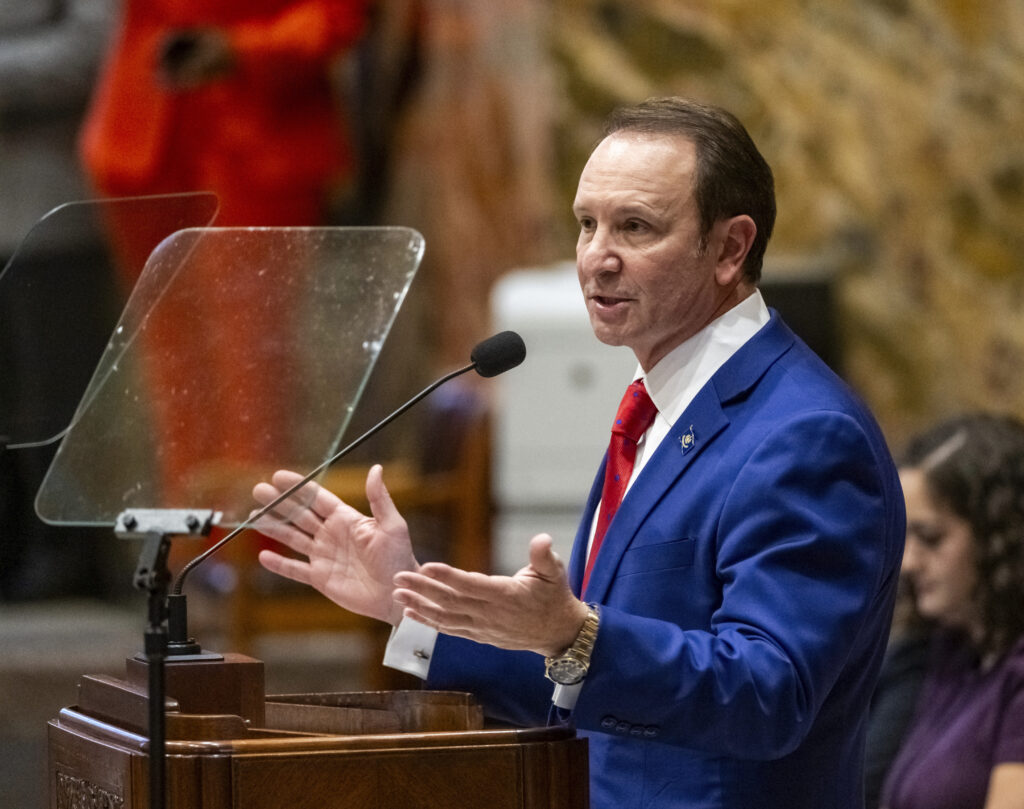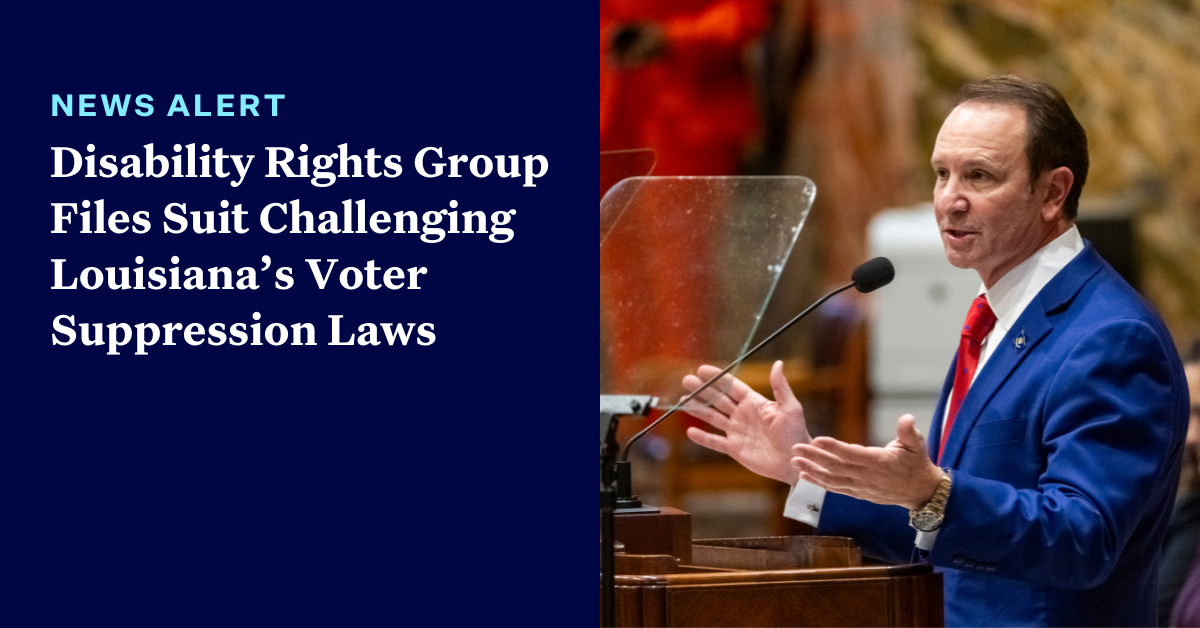 Louisiana Gov. Jeff Landry (right) speaks in the state Capitol chamber. (Michael Johnson/The Advocate via AP, Pool, File)
Louisiana Gov. Jeff Landry (right) speaks in the state Capitol chamber. (Michael Johnson/The Advocate via AP, Pool, File)
The Louisiana Disability Rights Association filed a lawsuit this week alleging that several Louisiana laws violate the Voting Rights Act (VRA).
The nonprofit is targeting two laws that make it a crime for multiple people to help mail absentee ballots or vote-by-mail applications, unless they are mailing them on behalf of an immediate family member. The laws go into effect on Aug. 1.
Disability rights groups argue that the law violates Section 208 of the Voter Rights Act, which says voters with disabilities are entitled to assistance from “a person selected by the voter.”
“These laws directly affect people with disabilities who want to vote absentee but do not have a close relative to help mail an absentee ballot,” the group said in an emailed statement. “Nursing home and group home staff will be subject to criminal penalties if they drop off more than one absentee ballot in a mailbox on behalf of a resident.”
The lawsuit also challenges two other laws that would make it a crime to witness an absentee ballot more than once by someone other than an immediate family member, starting July 1, 2025. In Louisiana, mailed absentee ballots cannot be counted unless they are witnessed.
“These laws unnecessarily restrict voting access for some of Louisiana’s most vulnerable people: people with disabilities,” Melanie Bray, an attorney with the Louisiana Disability Rights Coalition, said in an emailed statement. “We believe that these challenges to these laws are necessary to protect the voices of people with disabilities and ensure equal access to the vote for them.”
Read the complaint here.
For more details on this incident, please click here.
Learn more about voter accessibility here.
Last updated June 25th
Louisiana Governor Jeff Landry (R) signed two more voter suppression laws into law that limit voter outreach and make it harder to conduct voter registration drives.
Starting Aug. 1, House Bill 506 will require individuals and entities to register with the Secretary of State before conducting voter registration drives, except for certain election officials and those conducting electronic voter registration drives.
The law makes certain conduct a criminal offense, including completing information on someone else’s voter registration application without providing voter assistance as required by law.
Starting July 1, 2025, House Bill 581 would make it a crime for anyone other than an immediate family member to witness an absentee ballot and would require witnesses to be 18 years of age or older and to include a mailing address on the vote-by-mail certificate.
The law could make it more difficult for voters with disabilities to participate in elections, a problem shared by laws in many other states, including Wisconsin and California.
Governor Landry has also passed several other voter suppression bills over the past month, all part of the Department of State’s election integrity legislative package.
Last updated June 17th
Louisiana Governor Jeff Landry (Republican) signed a bill last week that requires proof of citizenship to register to vote and sets out procedures for removing people from voter registration rolls.
Senate Bill 436 would require proof of citizenship to be attached to voter registration applications starting Jan. 1, 2025. This could prevent non-citizens from voting, as well as many voters who cannot obtain proof of citizenship documentation.
In fact, one in 10 Americans of voting age does not have easy access to these documents, according to a new study, which adds that this affects minority voters the most.
The impact of this law would be felt on a grand scale in the 2026 midterm elections, as many voters would be unable to cast ballots and voter registration could decline.
Additionally, under the current circumstances, each county’s registrar of voters, who is part of the Department of State, is required to conduct an annual survey of registered voters and update voter registration records by June 30. If a voter’s address cannot be verified, the registrar must send the voter an address verification notice and move the name to the inactive voter list.
House Bill 114 would require the Secretary of State to identify registered voters who have not corrected their address, participated in an election in the past 10 years, updated their registration information, or taken other specified steps, beginning March 31, 2025. The Secretary of State must then send them address verification notices and remove them from the voter rolls.
Several right-wing groups, including the Public Interest Legal Fund (PILF), have filed lawsuits in states across the country seeking to remove people from voter registration rolls, which could disenfranchise many voters.
Governor Landry signed the two new bills on June 11th, following seven other voter suppression bills passed in the state last month.
Original post, June 4th
Louisiana Governor Jeff Landry (R) has signed seven anti-voter bills in recent weeks, with four more awaiting his signature.
Louisiana Secretary of State Nancy Landry, a Republican, released a statement Monday thanking the governor and state lawmakers for promoting and passing the “State Department’s Election Integrity Legislative Package.”
She said these bills “will help Louisiana continue on its path to maintaining its number one ranking in the nation for election integrity.”
On May 24, Governor Landry signed House Bill 285, which requires the Secretary of State’s Office to create an Election Integrity Division that will perform a number of tasks, including “conducting independent investigations of allegations of election fraud.”
He then signed six more election-related bills on May 28, including four dealing with absentee and mail-in voting.
House Bill 476 would prohibit anyone from mailing more than one absentee ballot unless they are sending a ballot on behalf of an immediate family member, something Rep. Wilford Carter (D-Louisiana) called a “voter suppression bill” on the House floor.
Senate Bill 155 would allow an individual to assist with multiple absentee ballots only if they are assisting an immediate family member.
Senate Bill 218 would require people assisting voters to provide their address and relationship to the voter, disclose whether they were paid for their assistance, and require that people only submit multiple applications for mail-in ballots on behalf of immediate family members.
Disability rights groups have filed lawsuits against similar laws in other states, including Ohio and Mississippi, arguing that the provisions make it harder for people with disabilities who can’t mail in or mark their own ballots to exercise their right to vote.
And under Senate Bill 226, absentee ballots that are missing information and not corrected by the voter are considered challenged ballots and will only be counted if a majority of the Board of Elections determines they should be counted.
The other two bills signed into law May 28 address different election issues. Senate Bill 449 defines a qualified voter or elector as “a person who has the proper qualifications as provided by law and is lawfully registered to vote,” and Senate Bill 101 bans ranked-choice voting in Louisiana elections.
And on Sunday, two bills formally passed the Senate: House Bill 506 would require individuals and groups to register with the Secretary of State before conducting a voter registration drive, and House Bill 581 would make it a crime to witness an absentee ballot unless it was an immediate family member and require witnesses to provide a mailing address.
In recent days, two bills have been sent to the governor’s desk, including House Bill 114, which would create new procedures for maintaining active voter rolls and outline the conditions under which individuals can be removed from the voter rolls.
Many right-wing groups, such as the Public Interest Legal Foundation (PILF), have brought to the fore the argument that states are not properly managing their voter registration rolls. Groups like PILF have filed lawsuits in many states to remove people from voter rolls that could disenfranchise large numbers of voters.
Another bill sent to Governor Landry this week is Senate Bill 436, which would require individuals to show proof of citizenship when registering to vote.
Last month, Republican lawmakers introduced a nationwide citizenship verification bill that would not only block already-banned foreign nationals from voting in federal elections, but would also create barriers for voters (often from minority groups) who don’t have photo ID or can’t obtain proof of citizenship.
Landry said in a statement Monday that he is confident the four remaining bills will be signed and is “looking forward to continuing our commitment to making Louisiana’s elections the safest and most secure in the nation.”
The Louisiana House Democratic Caucus did not respond to a request for comment as of publication.
Read the Secretary of State’s statement here.

